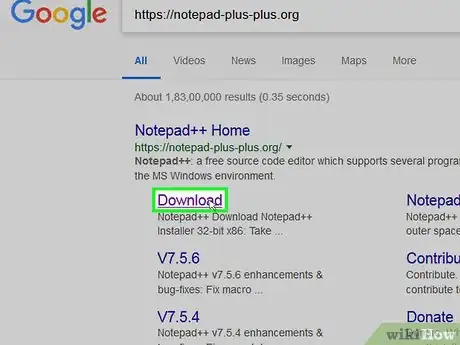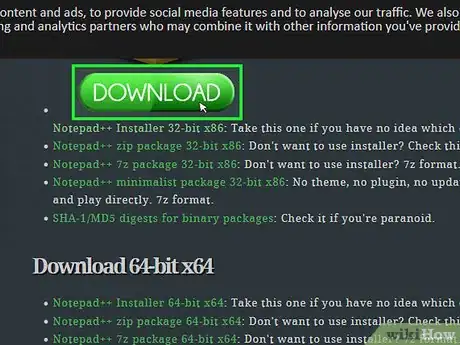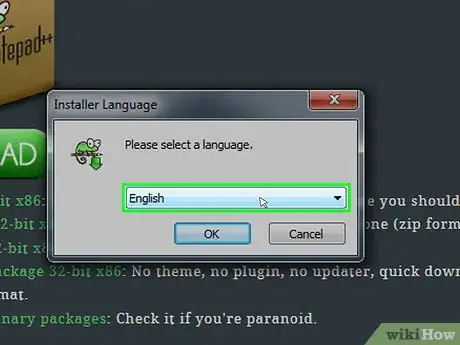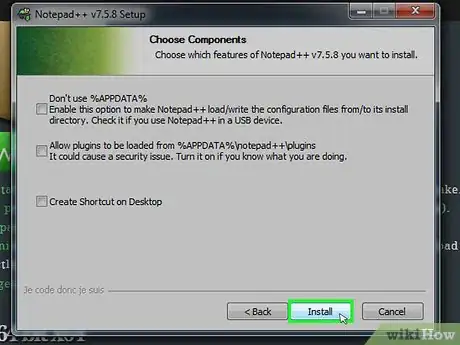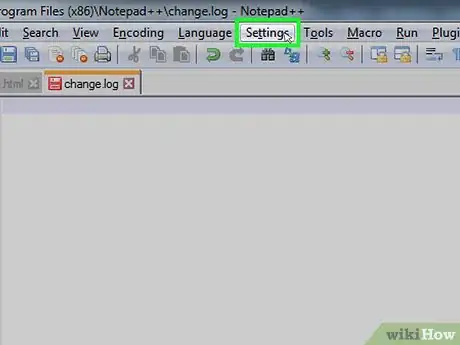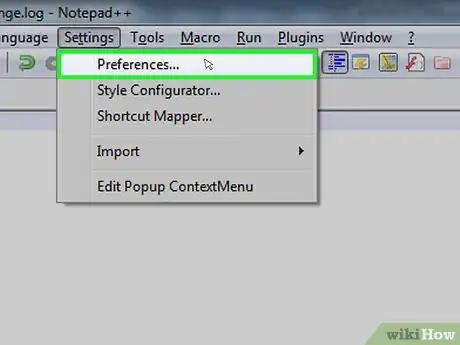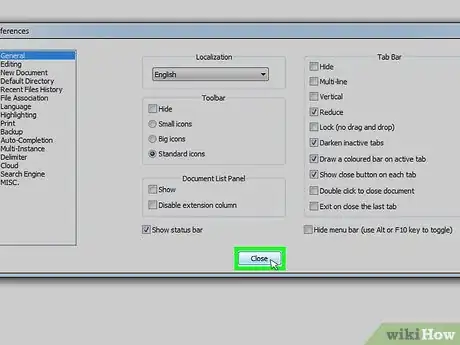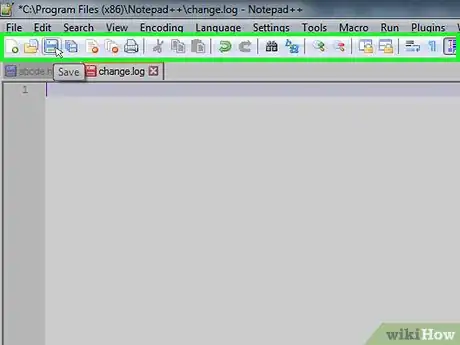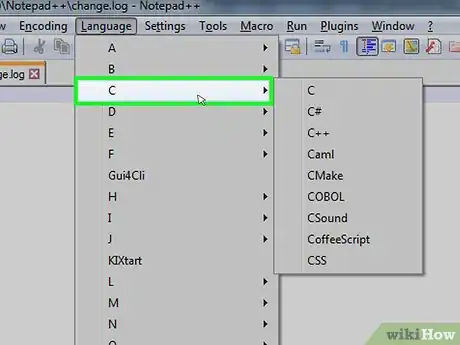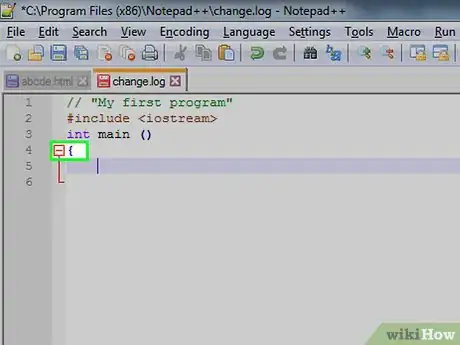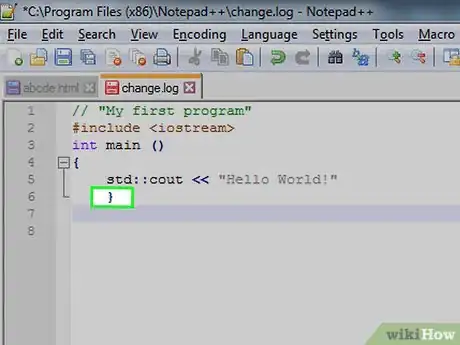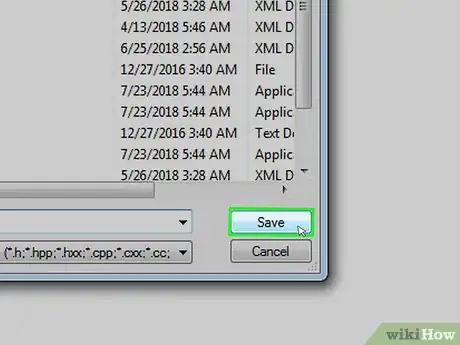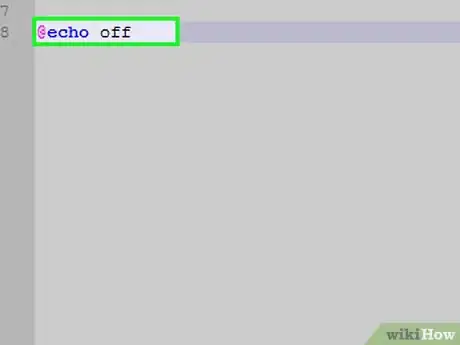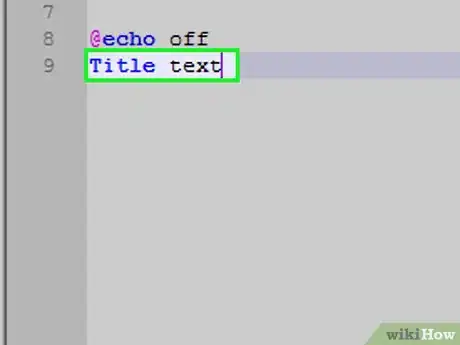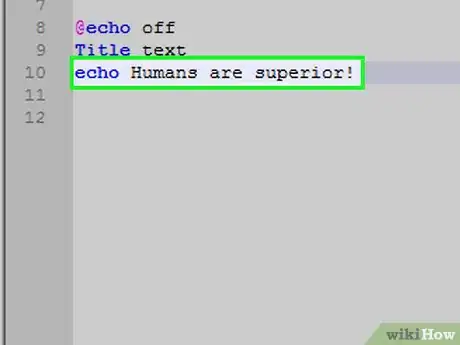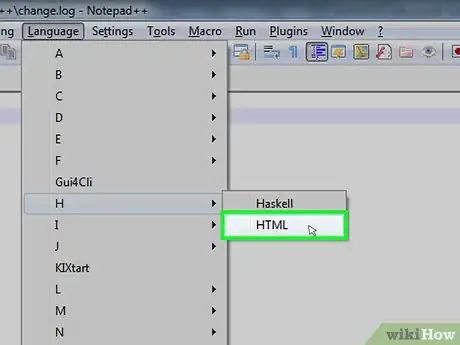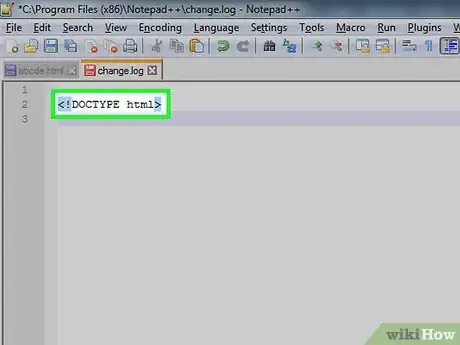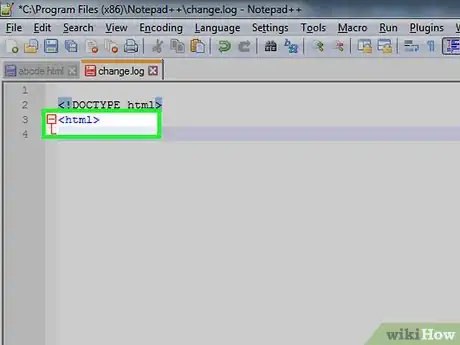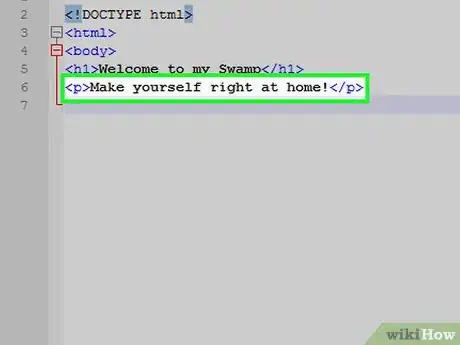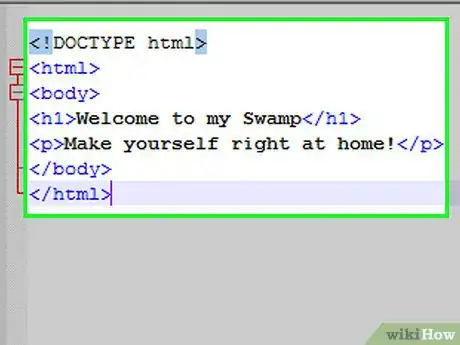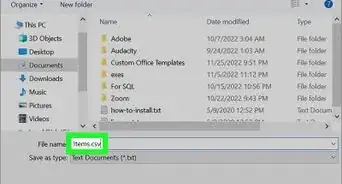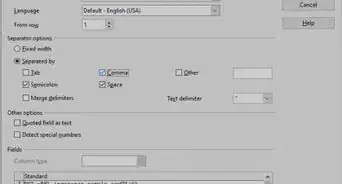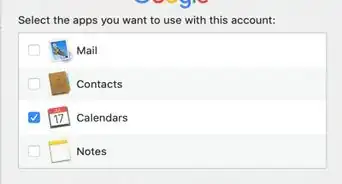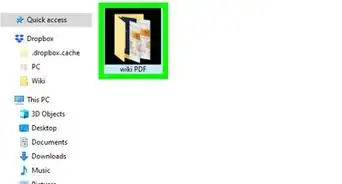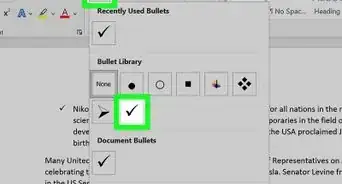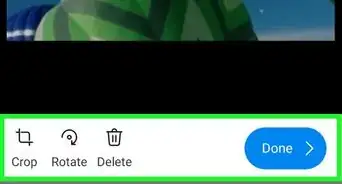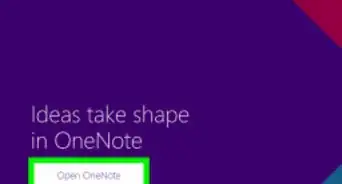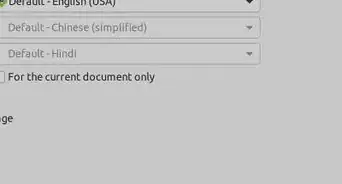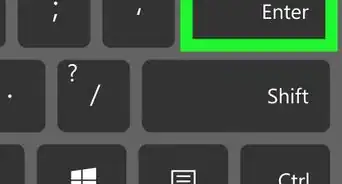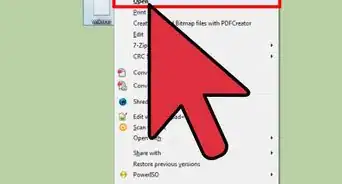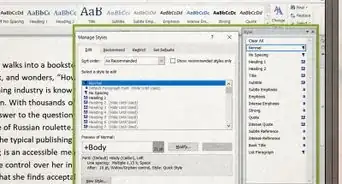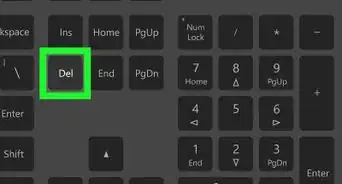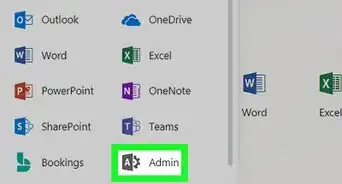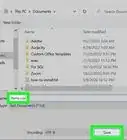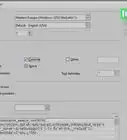This article was co-authored by wikiHow staff writer, Jack Lloyd. Jack Lloyd is a Technology Writer and Editor for wikiHow. He has over two years of experience writing and editing technology-related articles. He is technology enthusiast and an English teacher.
The wikiHow Tech Team also followed the article's instructions and verified that they work.
This article has been viewed 184,499 times.
Learn more...
This wikiHow teaches you how to install and use Notepad++ on your Windows computer. Notepad++ is a text editor that is optimized for programming languages, making it ideal for coding in languages like C++, Batch, and HTML.
Steps
Installing
-
1Open the Notepad++ website. Go to https://notepad-plus-plus.org/ in your browser.
-
2Click download. This tab is on the upper-left side of the page.Advertisement
-
3Click DOWNLOAD. It's a green button in the middle of the page. The Notepad++ installer will begin downloading.
- Depending on your browser settings, you may have to select a save location or confirm the download before continuing.
-
4Double-click the setup file. It resembles a green frog.
-
5Click Yes when prompted. The installation window will open.
-
6Select a language. Click the language drop-down box, then click the language that you want to use.
-
7Click OK. It's at the bottom of the Language window.
-
8Follow the on-screen prompts. Do the following:
- Click Next
- Click I Agree
- Click Next
- Click Next
- Check advanced options, then click Install
-
9Click Finish. As long as you leave the "Run Notepad++" option checked, doing so will both close the installation window and open Notepad++.
Setting up Notepad++
-
1Open Notepad++ if it isn't open. Double-click the Notepad++ app icon, which resembles a white pad with a green frog on it.
-
2Delete any text currently in Notepad++. You'll usually see some developer notes here, so just highlight and delete them.
-
3Click Settings. This tab is at the top of the Notepad++ window. Clicking it prompts a drop-down menu.
-
4Click Preferences…. It's in the Settings drop-down menu. Doing so opens the Preferences window.
-
5Review your Notepad++ settings. Look over the settings in the middle of the window, or click a tab on the left side of the Preferences window to change the category of settings that you're viewing.
- You can change these settings to your liking, but be careful not to change anything that you don't understand.
-
6Click Close. It's at the bottom of the Preferences window. Doing so saves any changes and closes the window.
-
7Review the menu buttons. Near the top of the Notepad++ window, you'll see a row of colored buttons. Hovering your mouse over each of the buttons will show you what each button does.
- For example, the purple floppy disk-shaped icon in the upper-left side of the window saves your progress on a project when clicked.
-
8
Creating a Simple C++ Program
-
1Click the Language tab. It's at the top of the window. Clicking it prompts a drop-down menu.
-
2Select C. You'll find this option in the Language drop-down menu. A pop-out menu will appear.
-
3Click C++. It's in the pop-out menu. Most programmers' first experiences with C++ involve creating a program that says "Hello, World!" when run, so that's what you'll do here.[1]
-
4Add a title to your program. Type in
//followed by your program's title (e.g., "My first program"), then press ↵ Enter.- Any text in a line that's typed after two slash marks won't be read as code.
- For example: to entitle your program "Hi Earth", you'd type
//Hi Earthinto Notepad++.
-
5Enter the preprocessor command. Type
#include <iostream>into Notepad++, then press ↵ Enter. This command instructs C++ to run the following lines of code as a program. -
6Declare the program's function. Type
int main ()into Notepad++, then press ↵ Enter. -
7Add an open bracket. Type
{into Notepad++, then press ↵ Enter. Your program's main code will go between this open bracket and a closed bracket later. -
8Enter your program's execution code. Type
std::cout << "Hello World!";into Notepad++ and press ↵ Enter. -
9Add a closed bracket. Type
}into Notepad++. This closes the program's execution phase. -
10Review your program. It should look something like this:
//Hi Earth#include <iostream>int main (){std::cout << "Hello World!";}
-
11Save your program. Click File, then click Save As... in the drop-down menu, enter a name for your program, select a save location, and click Save.
- If you have a program on your computer that can run C++, you should be able to open your Hello World program in it.
Creating a Simple Batch Program
-
1Click the Language tab. It's at the top of the window. Clicking it prompts a drop-down menu.
-
2Select B. You'll find this option in the Language drop-down menu. A pop-out menu will appear.
-
3Click Batch. It's in the pop-out menu. Batch is a modified version of the commands that you use in Command Prompt, so any Batch file will open in Command Prompt.[2]
-
4Enter the "echo" command. Type
@echo offinto Notepad++ and press ↵ Enter. -
5Add a title for your program. Type in
Title textand press ↵ Enter, making sure to replace "text" with your preferred title.- When you run the program, the title text is what will display at the top of the Command Prompt window.
-
6Enter display text. Type in
echo textand press ↵ Enter. Replace "text" with whatever you want Command Prompt to display.- For example, if you want Command Prompt to say "Humans are superior!", you'd type
echo Humans are superior!into Notepad++.
- For example, if you want Command Prompt to say "Humans are superior!", you'd type
-
7Halt the program. Type
pauseinto Notepad++ to indicate the end of the program. -
8Review your code. It should look something like this:
@echo offTitle Improved Command Promptecho Humans are superior!pause
-
9Save your program. Click File, then click Save As... in the drop-down menu, enter a name for your program, select a save location, and click Save.
- If you want to run your program, simply find it in its save location and double-click it to do so.
Creating a Simple HTML Program
-
1Click the Language tab. It's at the top of the window. Clicking it prompts a drop-down menu.
-
2Select H. You'll find this option in the Language drop-down menu. A pop-out menu will appear.
-
3Click HTML. It's in the pop-out menu. HTML is commonly used for website pages, so you'll be creating a basic webpage heading and subheading.[3]
-
4Enter your document header. Type
<!DOCTYPE html>into Notepad++, then press ↵ Enter. -
5Add the "html" tag. Type
<html>into Notepad++ and press ↵ Enter. -
6Add the "body" tag. Type
<body>into Notepad++ and press ↵ Enter. This indicates that you'll be entering a section of text or other body information. -
7Enter your page's heading. Type in
<h1>text</h1>and press ↵ Enter, making sure to replace the "text" section with your preferred page heading.- For example: to set your heading as "Welcome to my Swamp", you would type
<h1>Welcome to my Swamp</h1>into Notepad++.
- For example: to set your heading as "Welcome to my Swamp", you would type
-
8Add text below the heading. Type in
<p>text</p>and press ↵ Enter. You'll replace "text" with your preferred text (e.g., "Make yourself right at home!"). -
9Close the "html" and "body" tags. Type in
</body>and press ↵ Enter, then type in</html>. -
10Review your code. It should look like this:
<!DOCTYPE html><html><body><h1>Welcome to my Swamp</h1><p>Make yourself right at home!</p></body></html>
-
11Save your program. Click File, then click Save As... in the drop-down menu, enter a name for your program, select a save location, and click Save.
- As long as you select your language before saving, Notepad++ will choose the correct file format for you.
- You should be able to open your HTML file in any web browser.
Community Q&A
-
QuestionHow do I copy and paste when using Notepad++?
 Zander PolkCommunity AnswerYou should be able to use Ctrl + C (Copy) and Ctrl + V (Paste) to transfer text in and out of Notepad ++. However, if you are using a Mac or it just doesn't work for you, double click or highlight the text and right-click it and then press copy or paste from the choices listed.
Zander PolkCommunity AnswerYou should be able to use Ctrl + C (Copy) and Ctrl + V (Paste) to transfer text in and out of Notepad ++. However, if you are using a Mac or it just doesn't work for you, double click or highlight the text and right-click it and then press copy or paste from the choices listed. -
QuestionHow do I open a text file in Notepad++?
 Community AnswerClick on File on the very top left then click on open from the drop-down menu. Then navigate to the text file you want to open. Double-click on it or click on it then click open.
Community AnswerClick on File on the very top left then click on open from the drop-down menu. Then navigate to the text file you want to open. Double-click on it or click on it then click open. -
QuestionHow do I launch my project in Notepad++, especially in Notepad++ HTML?
 Patrick AntalCommunity AnswerRight-click on the file and select the option to open file with, an option box will open and allow you to select the program you wish you open the file with.
Patrick AntalCommunity AnswerRight-click on the file and select the option to open file with, an option box will open and allow you to select the program you wish you open the file with.
Warnings
- Selecting the wrong coding language will result in errors when attempting to run the program.⧼thumbs_response⧽
- Always perform a test run of your program before showing it to other people. This will give you a chance to iron out any issues or make any necessary tweaks.⧼thumbs_response⧽
References
About This Article
1. Download Notepad++ from https://notepad-plus-plus.org.
2. Run the installer.
3. Open Notepad++ in the Start menu.
4. Manage your preferences in Settings > Preferences.
5. Select a coding language from the Language menu.
6. Write your code.

